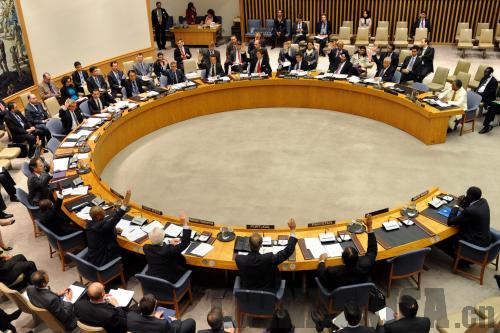|
 |
|
TALK THE TALK: UN continues to work for peace between South Sudan and Sudan |
looming war between Sudan and South Sudan has the whole world on edge. The African Union (AU), the Intergovernmental Authority on Development, the United Nations Security Council (UNSC), the Arab League and even the European Union have all asked the two countries to thrash out their grievances and not to return to war.
Top of that list of grievances is oil and the sharing of the colossal revenues that come from that crucial and lucrative resource, plus the delicate border demarcation.
South Sudan's neighbors, especially Kenya and Uganda, with hundreds of their citizens making a living in the newly independent republic, do not fancy the prospect of war. The last bloody one, which ended in 2005 with the signing of the Comprehensive Peace Agreement, had spawned thousands of refugees and a security nightmare in the host countries.
From tiff to conflict
What began as a political tiff over the sharing of oil revenues earlier in the year, quickly degenerated into armed conflict, with both Sudan and South Sudan, not only having their armies engaged in fighting, but also battling in proxy wars through the armed groups operating in some areas of the two countries.
The egos of the two leaders Salva Kiir of South Sudan and Omar al Bashir of Sudan are also at play, along with the egos of their respective people.
The violent flare-ups at the disputed oil-rich border of the two countries, Sudan's aerial bombardment of South Sudan, and the flexing of military muscles by South Sudan when it captured the Heglig oil field in Sudan, all threatened to escalate into full-scale war.
On one hand, Juba (South Sudan's capital) was busy recruiting soldiers, while the Khartoum (Sudan's capital) was threatening war, saying it was going to oust the "insect regime" in Juba.
Juba had decided that unless its oil was assured safe passage to the market, through the Sudan pipeline, it was ready to wait for an alternative export route through Kenya that is likely to be up and running in two years. A February 10 memorandum of understanding for the cessation of hostilities was quickly shunted aside even before the ink on it had dried.
"The level of bitterness, anger and distrust on both sides has never been so high," an alarmed AU Peace and Security Council noted in a report seen by ChinAfrica, dated April 24.
On May 2, the UNSC voted unanimously to impose non-military sanctions if peace through negotiation was not forthcoming. Russia and China unusually sided with the United States in the sanctions call. This was the strongest admonishment to date. The AU would oversee these negotiations.
China is a major investor in infrastructure in the two countries and is also one of the key buyers of oil from both countries.
|